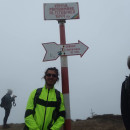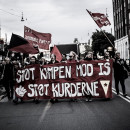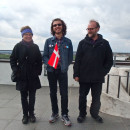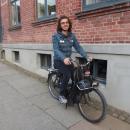Great opportunities here, as long as you get away from the Americans. Past Review
By A student (Brandeis University) - abroad from 08/17/2015 to 12/11/2015 with
DIS Copenhagen: Semester
I connected with Danish (and other international) activists in Copenhagen, learned more about the political situation in Denmark, got to see the work that I value from as it occurs different country. Also, I got to meet a Danish family and get their perspectives on the world, that was great, and I hope we shall continue to stay in touch! Also got to see more of the world from a tourist's perspective, including Copenhagen, other parts of Denmaark, and a handful of other countries, that's always fun. This program was very much worth it.
Review Photos





Personal Information
| How much international exposure did you have prior to this program? | 6 months+ |
Review Your Program
|
* Overall educational experience
Academic rigor, intensity, resources, etc. |
Classes were of appropriate academic quality, interesting and educational, and not overly stressful. Suitable for balancing with other activities while abroad. |
|
* Host Country Program Administration
On-site administration of your program |
No serious complaints. A bit of confusion about when I would be able to work for work study, but that was resolved in the end. |
|
* Housing:
How satisfied were you with your living arrangements? |
Had great experience with host family, got to see more of Denmark with them, had many interesting conversations. Also was located close enough to the city to travel everywhere by bike. |
| * Food: |
Being vegan in Copenhagen is very possible, but you wouldn't know it from most of what you hear from the program. Prepare to make your own way forward to some degree. However, in my own situation, my host family was very helpful with accommodating this, and DIS did pretty good job of finding vegan meals on every study tour and other optional trip. Also, be warned; if you're not living with a host family (or folkehøjskole, I guess), you have to buy your own food with your own money; the subsidy they give isn't intended to cover the whole semester. (If you're looking for a cheap vegan meal, come to a folkekøkken at BumZen, Bolsjefabrikken, or Folkets Hus. They have them at meetings and movie screenings, sometimes) |
|
* Social & Cultural Integration:
How integrated did you feel with the local culture? |
Living with a host family, and taking the initiative to seek out and get involved in local leftist political circles helped me personally become much more socially integrated. However, this won't happen as well if you stay within the confines of the institution of DIS and among other American students all the time. You gotta be proactive about this. |
|
* Health Care:
How well were health issues addressed during the program? |
I did not have any health issues during the program luckily, but I was covered by the Danish national health system for the time that I was there (except for the first few weeks before my documents were fully processed, my understanding is that DIS has an insurance policy that covers you for that time period). Dental isn't covered though, don't go to the dentist in Denmark. |
| * Safety: |
I did not personally ever feel unsafe, but I'm also a cis white man. And apparently, shouting "no racists in our streets" to counterprotest a permitted far-right protest is illegal, and can get you quickly nabbed by undercover police. (Didn't happen to me, but I witnessed it. Please keep in mind.) But overall, this place is probably much safer than the USA, mass shootings aren't really a thing, and the police are much less likely to kill anyone. |
| If you could do it all over again would you choose the same program? |
Yes
|
Finances
|
* Money: How easily were you able to live on a student's budget?
(1 = not very easy/$200+ on food & personal expenses/week, 2.5 = $100/week, 5 = very easily/minimal cost) |
Living with a host family, I did not need to buy food. I ate breakfast at home, packed a lunch from home, and ate dinner either at home or I skipped it to go to an event (and had leftovers afterwards). I occasionally bought food out of the house, but seldomly. IF YOU DON'T LIVE WITH A HOST FAMILY, THIS WILL BE DIFFERENT. YOU WILL HAVE TO BUY YOUR OWN FOOD. With public transportation, they give you a pass that covers your commute for the semester. I traded mine in back to them for a bit under $300 because I ended up biking almost everywhere anyway. (This worked well until the last week when I got a flat tire that wouldn't get fixed, I think the bike might have been damaged somehow). So most of my own expenses were: the two optional trips that I paid for, a bit on souvenirs, once for a train ticket to Sweden, once for a bus ticket to Paris at the very end... Wasn't to difficult for me to save money, but it was largely because I was with a host family. |
| Not including program expenses, about how much money did you spend on food and other expenses each week? | Negligible |
| Do you have any general money-saving tips for future study abroad participants? | Don't eat out, pack a lunch. Don't travel every weekend. |
Language
| * Did your program have a foreign language component? | Yes |
|
How much did the program encourage you to use the language?
0 = No encouragement, 5 = frequent encouragement to use the language |
OK, yes there was a Danish Language & Culture class. This was the only institutional encouragement we got to speak Danish, the rest of the program was in English entirely. The Danish Language & Culture Class (twice a week) was taught in English, and a significant portion of it was learning about culture (which was kinda interesting a lot, but in English). We had a few rudimentary speaking exercises in class, but not significant. |
| How would you rate your language skills at the beginning of the program? | Beginner |
| How would you rate your language skills at the end of the program? | Intermediate |
| What was the highest level language course you had completed prior to departure? | Duolingo, level 5. |
| How many hours per day did you use the language? | |
| Do you have any tips/advice on the best ways to practice the language for future study abroad participants? | Practice on Duolingo. Get away from the American saturated spaces of DIS and find some local groups to get involved in, whatever your interests are. It won't always be easy breaking in to such spaces, but that's one of the only way you'll have the chance to hear and practice Danish. Also, living with a host family and talking with them (and their friends and relatives who might not be as practiced in English is a big help) |
Other Program Information
|
* Where did you live?
Select all that apply |
|
|
* Who did you live with?
Select all that apply |
|
|
* Who did you take classes with?
Select all that apply |
|
| About how many local friends did you make that you will likely keep in touch with? | 10+ |
A Look Back
| * What did you like most about the program? |
|
| * What could be improved? |
|
| * What do you know now that you wish you knew before going on this program? | Although Danish is grammatically fairly simple and not as difficult to learn to read, understanding a word of what people are saying is a different story. You gotta study and practice it A LOT if you want to seriously be able to get by in it. |








